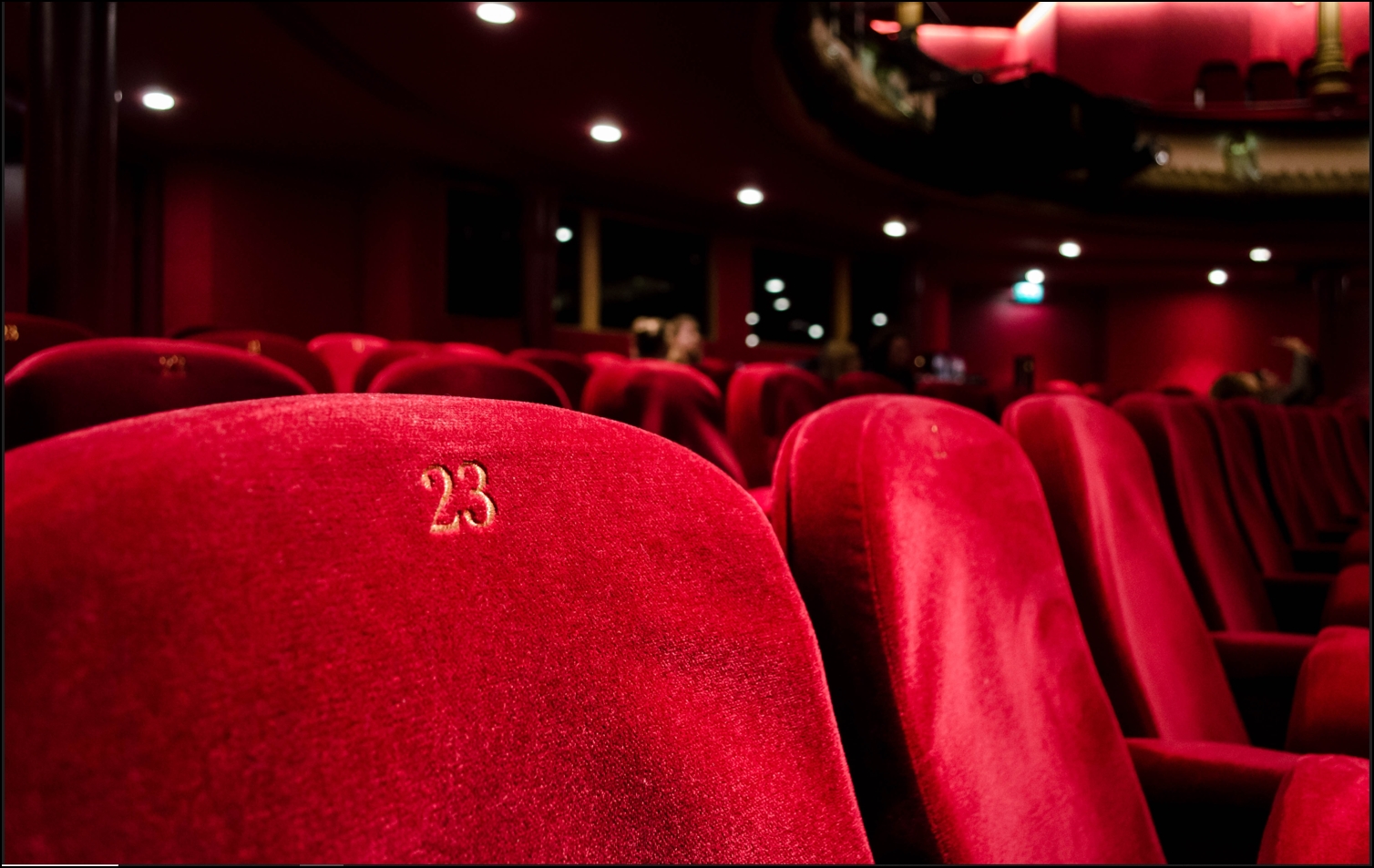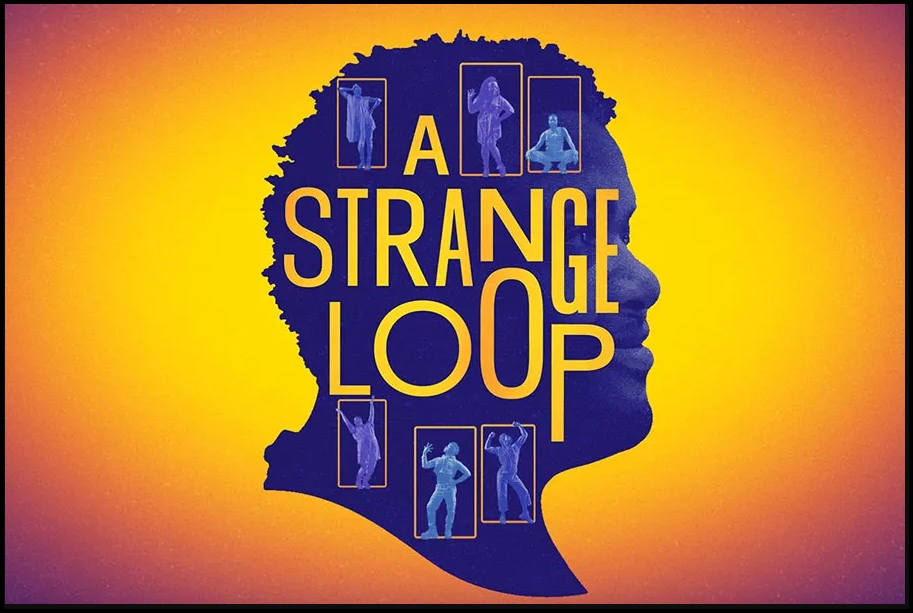By Barry Willis
A would-be creator of musical theater named Usher wrestles with his demons in Michael R. Jackson’s one-act musical fantasy A Strange Loop. The West Coast premiere of the seven-actor, no-intermission, nearly two-hour production runs at ACT’s Toni Rembe Theater through May 12.
A poorly paid young theater usher (Malachi McCaskill) is the only character with a name in Jackson’s Pulitzer Prize and Tony Award-winning script. The others are called “Thought 1,” “Thought 2,” etc., because they exist only in the protagonist’s mind.
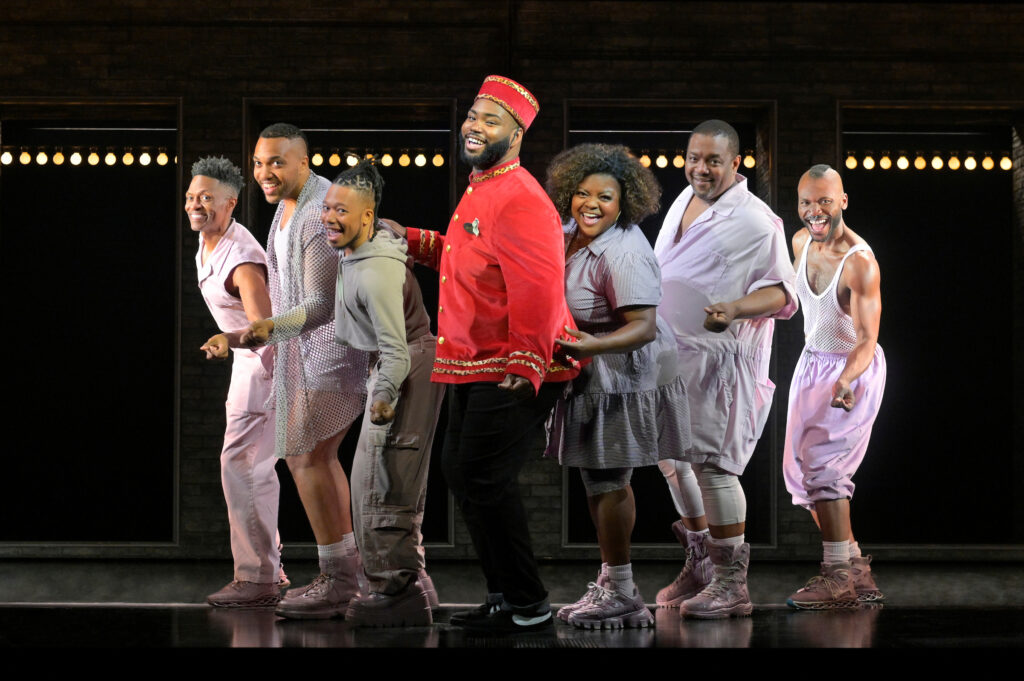
His demons include profoundly obsessive issues about family, culture, identity, body image, loneliness, sexuality, and ambition. In various combinations, they’re all eating away at him. It’s a wonder he can function.
… Strange Loop is certainly challenging and transgressive …
Sharply directed by Stephen Brackett, A Strange Loop opens with an explanation by Usher of the significance of the show’s title: a concept of the self, put forth by cognitive researcher Douglas Hofstadter about the human ability to perceive ourselves. We begin at one point, wander about in a miasma of fantasies, remembrances, and hall-of-mirrors self-concepts, then ultimately return to where we started—an interpretation of life as an exhaustive exercise on a closed-loop obstacle course.
Usher spends his work hours escorting theater fans to their seats at the perpetual Broadway show The Lion King, and his remaining time dreaming about writing his own musical theater blockbuster. Owner of both keyboard and computer, Usher carries with him a little notepad on which he jots down ideas, but when he sits at his desk he accomplishes little more than self-pity. He has many concepts—most of which play out very effectively on ACT’s stage—but no all-encompassing scheme to put them together.
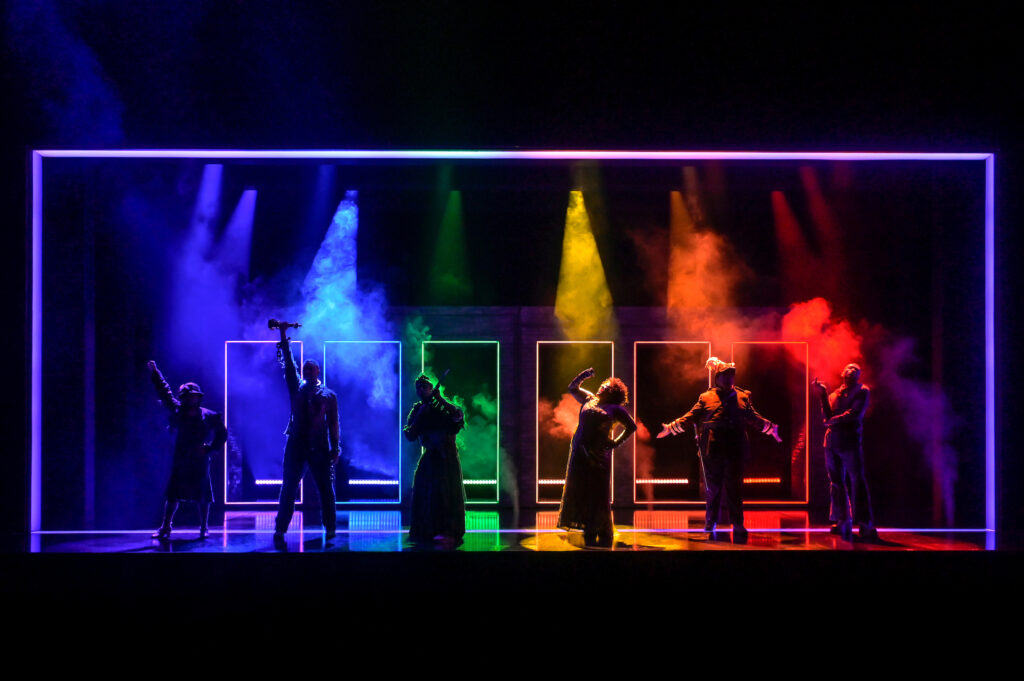
What we get, rather than a traditional beginning-middle-ending storyline, is a hodgepodge of Usher’s imaginings, from hilarious to horrific, all of them brilliantly delivered in rapid-fire succession on Arnulfo Maldonado’s astounding set. We get the show’s amazingly talented actors/singers/dancers as multiple and widely divergent characters, including not only garden-variety and exotic theater people, but promoters, advisors, gay men cruising for momentary hookups, and a huge array of black stereotypes, such as Usher’s aloof, beer-drinking father (Jordan Barbour) or his Bible-clutching mother (John-Andrew Morrison), who begs him to abandon his sinful lifestyle and return to the church.
There’s plenty of sly self-deprecating humor in Jackson’s tale, but the outstanding moment of confrontational comedy comes with a depiction of Usher’s slacker brother, clad in giant oversize basketball shorts, who lives rent-free with his ditzy girlfriend in the parents’ basement. It’s a moment out of The Jerry Springer Show.
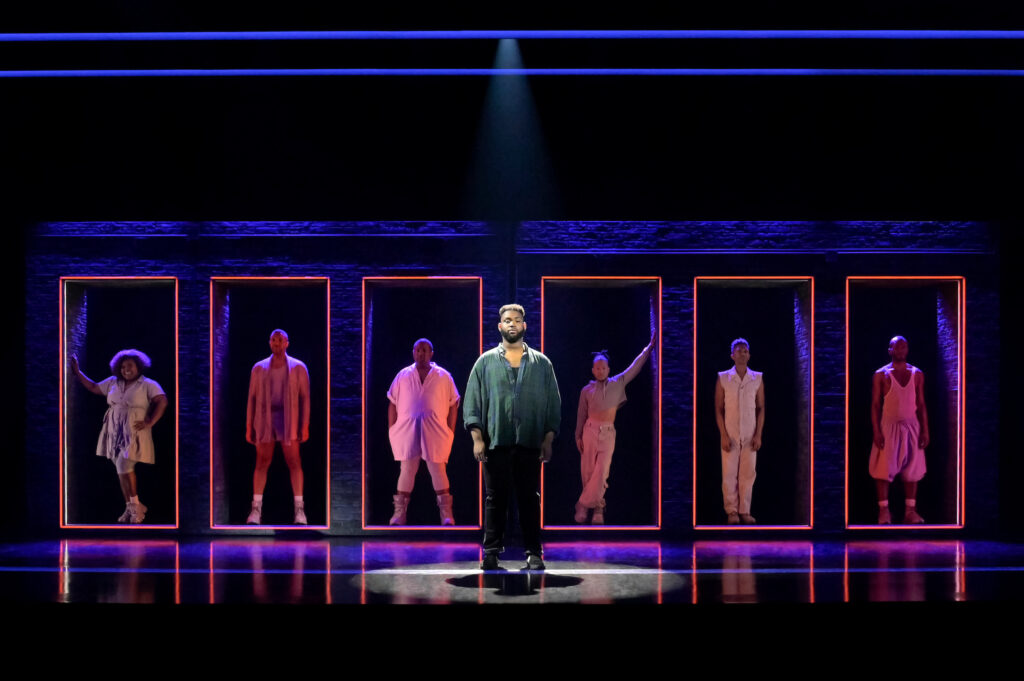
At the other end of the emotional spectrum is a scene where Usher reluctantly submits to an encounter with an overbearing older man, an encounter as painful and grim as a prison rape. When it’s over, Usher shuffles away in shame. He’s already mentioned that he’s not a particularly prolific gay man. If this is an example of his once-yearly erotic adventures, he’s a miserable soul indeed.
By far the highlight of A Strange Loop is the big-production gospel sendoff for departed cousin Darnell, a victim of HIV. The funeral is a conflation of Usher’s guilt, his experience growing up in the church, and the urgings of friends and theater promoters for him to create “a Tyler Perry musical.” Set designer Maldonado is at the top of his game with this creation, alone almost worth the price of admission. Clad in glittering choir robes, the supremely talented performers make it shimmer and shine.
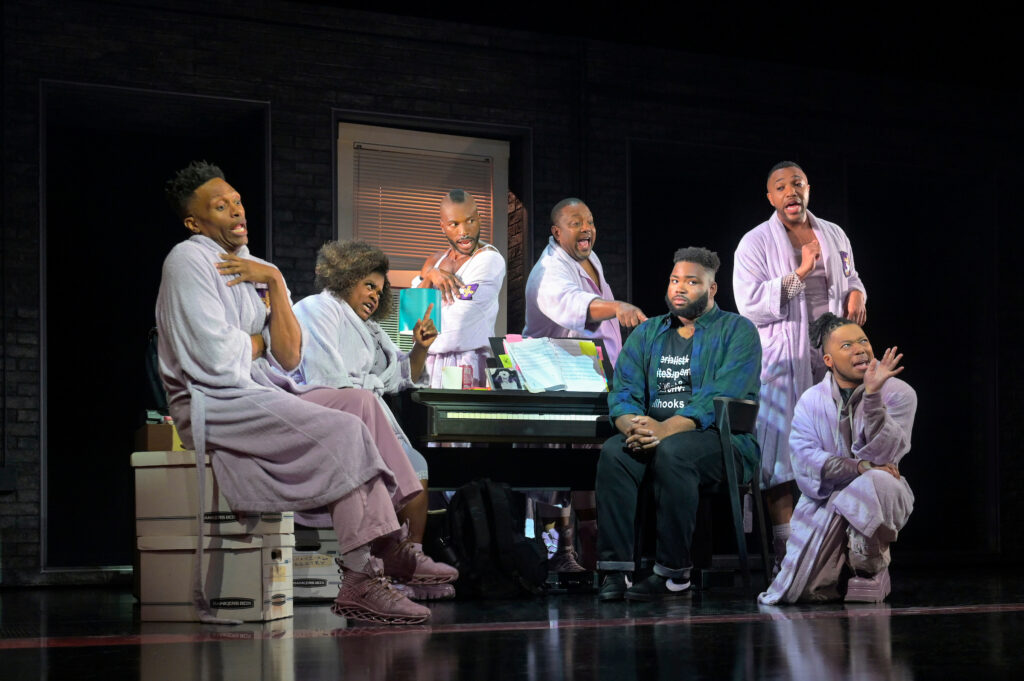
Some observers have opined that McCaskill’s voice is inadequate for the demands of the music, but his apparent vocal shortcomings actually reinforce the verity of Usher’s deep self-doubt. His less-than-assertive singing style is likely intentional.
In all his interactions with other characters, there’s only one positive note. Toward the end, Usher has a friendly chat with a rabid theater fan, a lady standing near the aisle with a souvenir poster of The Lion King. Among the many parts she plays in this show, the gifted Tarra Conner Jones provokes a warm response when she gives him heartfelt encouragement to pursue his dreams.
Does he follow her advice? That’s not made clear. In keeping with the show’s introductory remarks, we return to where we began. There’s no character arc in A Strange Loop.
After a long wild ride through the tormented mind of an insecure artist, we find that he’s exactly as he was when the tale began. It’s a ride that’s by turns audacious, confounding, annoying, offensive, beautiful, pointless, uplifting, depressing, poignant, amazing, and celebratory. Most importantly, it’s thought-provoking—and absolutely not recommended for children.
Among the most enduring clichés about contemporary art is the assertion that really effective pieces should be “challenging, transgressive, and transformative.” A Strange Loop is certainly challenging and transgressive. Is it transformative? That’s a purely personal assessment.
-30-
 ASR NorCal Executive Editor Barry Willis is a member of the American Theatre Critics Association and president of the SF Bay Area Theatre Critics Circle. Contact: barry.m.willis@gmail.com
ASR NorCal Executive Editor Barry Willis is a member of the American Theatre Critics Association and president of the SF Bay Area Theatre Critics Circle. Contact: barry.m.willis@gmail.com
| Production | A Strange Loop |
|---|---|
| Written by | Michael R. Jackson (book, music, and lyrics) |
| Directed by | Stephen Brackett |
| Producing Company | American Conservatory Theater (ACT) |
| Production Dates | Through May 12th |
| Production Address | Toni Rembe Theatre, 415 Geary Street, SF, CA |
| Website | www.act-sf.org |
| Telephone | (415) 749-2228 |
| Tickets | $25 – $137 |
| Reviewer Score | Max in each category is 5/5 |
| Overall | 4/5 |
| Performance | 4.5/5 |
| Script | 3.0/5 |
| Stagecraft | 4.5/5 |
| Aisle Seat Review PICK? | ----- |
